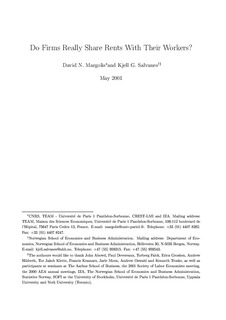Do firms really share rents with their workers?
Working paper

View/
Date
2001-05Metadata
Show full item recordCollections
- Discussion papers (SAM) [655]
Abstract
We use matched firm - worker panel data from France and Norway to consider observationally equivalent alternatives to the hypothesis that firms share product market rents with their workers in the form of higher wages. After documenting the main stylized fact, we find that neither the main statistical explanations (group effects in residuals and measurement error) nor sectoral shocks seem to be responsible for the observed correlation. Statistical-economic explanations (endogeneity of profits, omitted variable biases in terms of individual productive characteristics) are slightly more successful, as instrumentation reduces the significance level in France to 89% (via an increase in the standard error of the estimate). The most complete model, with unobserved heterogeneity in both time-invariant firm compensation policy and time-invariant individual characteristics, instrumental variables and a complete set of controls for worker observables and sectoral shocks renders the coefficient insignificant for France and weakens its significance for Norway. This result is coherent with the multi-level bargaining structure found in Norway and the presence of a more mobile labor force in France, although it may also be due to insufficient degrees of freedom.
Description
Abstract and keywords also in French
Publisher
Norwegian School of Economics and Business Administration. Department of EconomicsSeries
Discussion paper2001:11